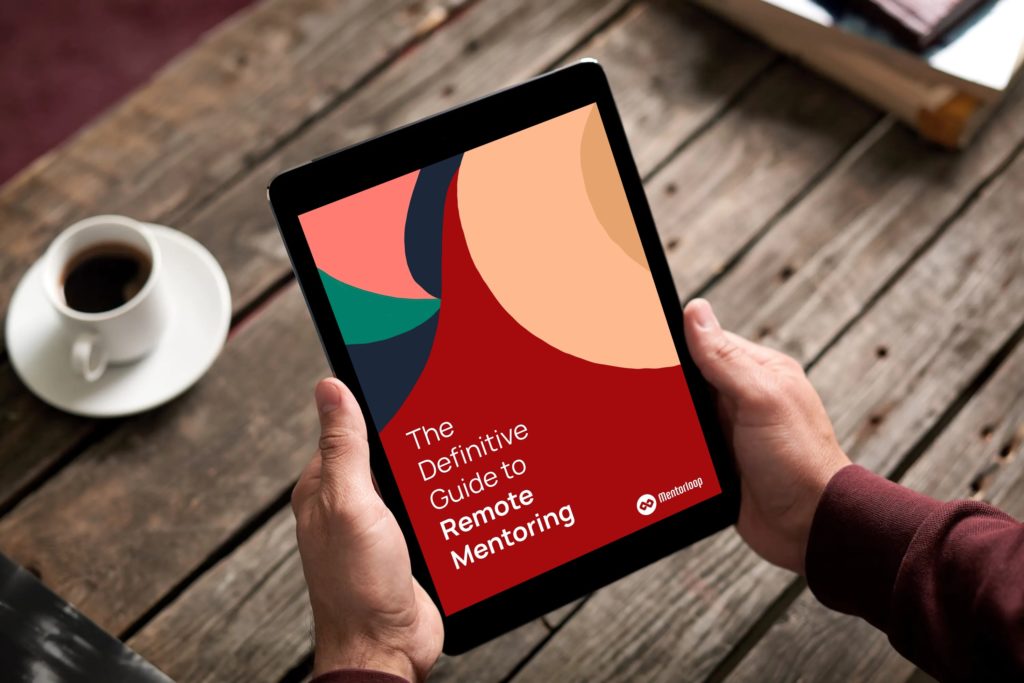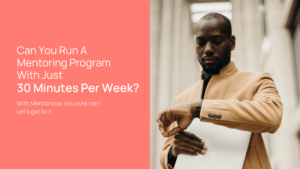This week, Mentorloop CEO and co-founder, Lucy Lloyd, spoke with Peter Ryan from Fluent Leadership. Peter brings over two decades of senior Learning and Organisational Development experience gained across a diverse range of workplaces.
View the webinar above, or enjoy the transcript below:
Peter: Hello Lucy, how are you?
Lucy: Very well thanks. Thanks so much for having me, Pete.
Peter: I’ve been looking forward to this, simply because I think mentoring is such an important part of people’s careers and indeed their lives and I’m really excited to see the features and the benefits of Mentorloop, that you’ve co-created with Heidi Holmes.
Having been in HR for quite some time (I’m actually very very old), I’ve seen traditional mentoring programs that are quite cumbersome, they’re programmatic and sometimes they fall by the wayside because it’s just such an administrative burden to check up on people.
You’re never really sure how much rubber is really hitting the road you know, or how much benefit is actually being realised.
So that’s why I’m excited by Mentorloop and I suppose that leads in nicely to talking about the fact that you saw that need and how that came about.
Lucy: Sure, so my co-founder Heidi and I, were friends before Mentorloop (we’re still friends) and we co-founded Mentorloop together after a conversation, like everybody has with their friends, having a glass of wine, talking about our careers and the transitions that you inevitably go through in your careers; whether you’re entering a new industry, starting a new job, and the fact that can’t see around corners. We started talking about mentoring as a way to equip ourselves to navigate those transitions and that kind of led to exploring the question – well, what if there was a dating site for mentoring relationships? And that led to a great deal of research that we undertook with organisations running mentoring programs.
What we saw were the same things again and again, which was as you’ve alluded to, the admin burden getting in the way of what mentoring really is about.
“People were up to their elbows in spreadsheets and emails, they couldn’t scale the impact of mentoring, and it became just too much overhead to actually optimise success.”
The second thing was, there was this phenomenon that we witnessed – a flurry of activity upfront but once the match was made, those relationships were kind of left to wither on the vine. People were left to their own devices and they lost momentum.
Finally, it was really difficult for organisations to measure and demonstrate success. I think we all appreciate that mentoring is wonderful but we wanted to get a little bit harder with the results and demonstrate how mentoring actually impacts engagement, retention, productivity among other benefits.
What we’ve built is a platform that helps ease that admin burden, enables deeper connections across organisations but specifically outcomes-based connections that support both professional and personal goals, with real-time engagement monitoring for people leaders and also just general sentiment monitoring amongst their teams as well.
It makes building a mentoring culture swift, scalable and visible for organisations.
Peter: For me, that real-time sentiment monitoring, that just sets it so much apart from the trailing indicators that you may or may not get of questionable quality from traditional models of doing ‘the ring around’ or doing a survey.
I think those connections are so important to ensure that they’re delivering value and something I love from your website is the quote, the right connection can change a life and to me, that strikes at the heart of the importance of mentoring and also talks to the importance of connection, particularly in the the “new normal” in which we’re working now, virtually, remotely and with flexibility.
Have you seen a lot of the benefits in that new remote working environment now?
Lucy: Absolutely, and I think what we mean by the right connection can change your life is what it says, which is that we do have these life-changing connections that we make, but also breaking it down at the micro-level. You know you don’t always know what’s life-changing in the moment and so the more of these connections you have – the more cups of coffee, the more insights that you gather from other people who might have more experience, or even from your peers – these little insights in the moment don’t necessarily seem that huge, but they might be a slight course-correction that over time, over the trajectory of your career, they become a much bigger part of who you are and how you operate.
So when we talk about life-changing connections, it might not always be recognisable in the moment but it has an impact that reverberates through your career. In the current environment where remote and flexible work has been absolutely accelerated by global events and we’re working towards a very different future.
For us, what comes to the forefront in that new reality is the benefit of asynchronous communication and that is, communicating on your own terms. It’s amplified because we aren’t in offices together and we’re not all keeping the same time. We now have this opportunity to communicate on our own terms, feel the benefits of crafting your day to suit your needs where we work the hours that suit us best, around other things in our lives.
What this does, is it makes these life-changing connections actually more accessible for people and not just the connections but any learning and development opportunities.
In contrast, once upon a time, formal mentoring favoured the bold – it favoured people who had great networks who were in the right place, at the right time. Now, there’s an opportunity for people to put themselves in those connections and those relationships that they might not have otherwise been able to access.
Pete: I agree, I think these connections are so important and in particular, in this environment, multiple and different types of connections where we’ve collectively undertaken such a massive change.
For some people, working in an isolated virtual environment is a brand new experience. As we navigate it together, there’s mental health concerns arising as well, so offering mentoring to people that are feeling isolated, can have a strong impact and ensuring those connections continue are vital.
Lucy: Absolutely, it’s kind of at two levels isn’t it? Because of the rapid rate of change and the disruption and the fear that happens with that, but then also it’s the nature of the change that has put us in our own homes, locked down essentially.
“Even after lockdowns ease, we’re emerging into a world where we will still spend a lot of time working alone, which makes a lot of people thrive but can also have a serious mental health impact”
So making those connections more available and accessible to people can obviously help alleviate the isolation and you can kind of feel when you’re working alone, that it’s “all work” and you don’t have that social interaction that you would naturally have had, physically going into work. So it’s great to actually have points of the day that are for mentoring or networking.
When we are isolated and in some ways waiting to see how the pandemic plays out, we can all feel like we’re “on pause” a little bit, like we’re in limbo, and it’s hard to plan for the future while the future’s still revealing itself.
What mentoring does, is it helps people feel like they’re moving forward and that they’re developing. I know personally, if I don’t feel like I’m learning new things I feel like I’m going backwards, and so in some ways, it’s important to feel like we have a sense of mastery, that we’re taking information and developing ourselves.
The final thing with mentoring specifically is it actually is a really human way to check in on each other. For organisations, the scale of checking in on people that’s required means that they’re constantly running surveys or they’re doing things that don’t feel very human but if you’re connecting your people in deeper relationships, then they’re looking out for each other. They’re also more likely to feel part of something bigger as well, which can help with mental health and well-being.
Peter: Something that I’ve always been fascinated about is “reverse mentoring,” that is, the more experienced people getting mentored by often younger, Gen Y or “digital natives” even. I think that’s an interesting thing and it probably removes some of the traditional barriers that could be seen within a normal corporate environment of connecting with a younger person to be mentored. In particular, using new tools, connecting digitally and I’m keeping those connections.
Do you see much reverse mentoring?
Lucy: We do, and we actually prefer to use the term “reciprocal mentoring” because by the simple act of saying “reverse” we’d be alluding to something that’s one-way, where in practice, all mentoring is really two-way.
If each person gives of themselves and receives benefit and whether it’s the exchange of enthusiasm for experience or if it’s a trade of technical skills, whatever it is, both parties are benefiting.
We do like to talk about reciprocal mentoring but “reverse” can be a very handy term if you’re trying to build and promote a program for a more traditional organisation too.
Peter: And you’re not just seeing the benefits in organisations or corporations are you, you’re seeing it more broadly – can you talk to us a little bit about that and what sort of connections you’re seeing outside of those environments?
Lucy: Absolutely, we’ve seen this very real, encouraging and heartwarming surge of interesting programs where organisations like local government or industry associations that are looking for ways to impart connection and meaning to their membership bases or their communities.
One is the City of Melbourne, and they’re currently running a mentoring program for young musicians to connect with more senior musicians and help them hone their craft and enter the industry.
We’re also speaking to a number of sporting organisations like the United States Tennis Association about connecting their officials in mentoring relationships and we work with an amazing organisation called Women Offshore who are literally connecting women offshore – in submarines, on offshore oil rigs or in cruise ships, wherever it happens to be, to help them navigate what is traditionally a very male-dominated industry.
“Mentoring doesn’t just have to mean “professional”, there is a blurring of personal and professional and it’s at that intersection that mentoring really thrives for people. “
Peter: That’s fantastic and I love the notion of connecting people globally too, being able to break down all those barriers. Whether it be offshore, or fly-in fly-out work, those sorts of traditionally isolating environments too.
These days, we don’t just work within traditional groups or hierarchical structures anymore do we? A lot of the work does get done via connections and creating virtual teams or virtual support networks. Obviously, you’d be seeing a lot of cross-department, cross-specialties, cross-discipline work, throughout the platform.
Lucy: Yes, absolutely. Particularly with the shift to remote work, virtual mentoring reveals the power of networks to get things done and it’s that cross-pollination of ideas where formally you might have been locked into a team or locked into a silo or department, now there’s this opportunity to cut across streams and cut across the hierarchy because as we know, the real work gets done in networks. You might not always want to go to your boss for help or advice, you might want to chat to someone else’s boss or someone in another team.
It’s very difficult in this new reality to simply walk down the hall and ask a question. So we need to ensure we’re creating a way to generate those non-obvious connections that can have a very and real lasting impact on both the individuals and the organisations involved.
There still needs to be a replacement for that “water cooler chat”, the networking nights and those incidental social things that happen in the workplace.
Peter: And so much more than just that instant chat, or that brief in-the-moment interaction, instead, it’s a real connection and it’s real development and relationship building for the individuals.
It’d be remiss of us not to talk about the platform and the resources that you have, but I believe you’ve also just recently completed an ebook as well around mentoring?
Lucy: We have – along with a lot of organisations, we’ve been searching internally and externally for how we can help our people connect and to realise their potential even while they might be facing obstacles in their day-to-day at the moment.
So what we’ve been doing is producing a lot of resources around remote work, remote leadership and of course remote mentoring – so we’ve published an ebook recently, “The Definitive Guide to Remote Mentoring” and while it’s broken down into very easily consumed chapters, it really is a full-fledged resource to help both organisations and individuals think about how mentoring can foster connections, help people come out of isolation, even help people take advantage of the new flexibility that a lot of people do find themselves within, to continue their development and continue their contribution, as well.

Peter: Wouldn’t it be marvellous you know, when we do come back in some sort of hybrid fashion into the offices, if organisations were able to see deeper connections, more collaboration, and those virtual sorts of networks that have been created because of this environment, and because of a tool like Mentorloop that’s enabled them to do that.
Lucy: It would be marvellous and will be, and I think there’s a real opportunity for organisations because it’s a bit of a leveller.
When everybody’s at home dialling in, they’re not always (this is a terrible example) but they’re not playing golf with the boss – they’ve all got an opportunity to connect individually and to contribute. We can’t lose sight of that connection piece, even while other events might be pushing it to the sidelines.
Peter: Having seen the Mentorloop platform myself, I just couldn’t imagine trying to do mentoring in a traditional way without the support, the functionality and the real-time sentiment feedback that you’re able to get through the platform. To me, it’s the new and the only way.




